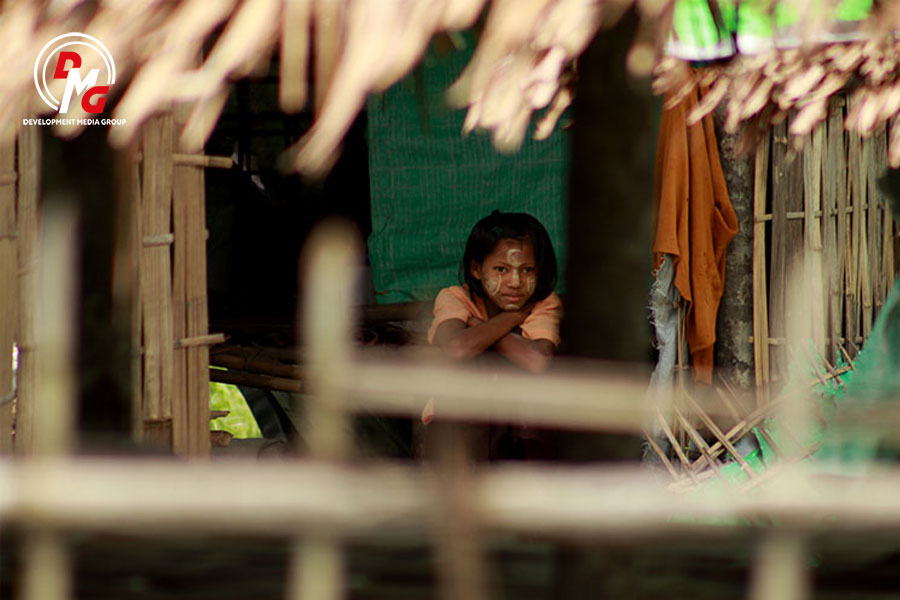- Arakan Army’s handover of 73 Bangladeshi fishermen signals potential boost in border cooperation
- Myanmar military officers accused of profiting from dismantled homes in Sittwe villages
- DMG Editorial: A Parliament Without the People Cannot Govern Arakan
- Displaced Arakanese struggle to rebuild homes leveled by junta airstrikes
- India suspends Arakan trade route for two months after death of truck driver in Paletwa
Interview: Life in war-weary Rathedaung
Social worker Ko Kyaw Lin Oo, who has been actively helping internally displaced people (IDPs) in Rathedaung Township, recently spoke to DMG about the latest developments there.
28 Dec 2024

DMG Newsroom
28 December 2024, Mrauk-U
The military junta's blockade of trade routes and human rights violations in Arakan State have taken a heavy toll on the daily lives of the local population.
Social worker Ko Kyaw Lin Oo, who has been actively helping internally displaced people (IDPs) in Rathedaung Township, recently spoke to DMG about the latest developments there.
DMG: What is the current situation in Rathedaung?
Ko Kyaw Lin Oo: The people in Rathedaung Township are suffering in many ways. They face difficulties in their livelihoods. Commodity prices in Rathedaung are about two times higher than in other townships. Most locals are unemployed. Public access to healthcare services has been further limited by travel restrictions. It has become more difficult to connect with other regions. We have lost access to phone and internet services since the conflict started.
DMG: What kind of difficulties are locals facing regarding their livelihoods? How are they coping?
Ko Kyaw Lin Oo: With no jobs, locals rely on crops grown locally. However, they could not cultivate all their farmland due to armed conflicts, and yields have also declined as they could not take care of the plants properly. Locals are surviving on just enough food.
Regarding basic commodities, goods primarily come from Kyaukphyu and Bangladesh. Goods from Bangladesh are higher in price. For example, if an item from Kyaukphyu costs 10,000 kyats, Bangladeshi stuff is around 15,000 kyats. Commodity prices in Rathedaung are almost double the prices in other townships. So, things are harder for residents.
DMG: Communications have been completely down in Rathedaung. To what extent has it affected the lives of locals?
Ko Kyaw Lin Oo: Everyone has experienced difficulties as phone and internet services have been lost since the renewed fighting. There are families who rely on remittances sent by their relatives working abroad. Things became harder as they lost contact with them.
It costs nearly 100,000 kyats to make a phone call. People have to climb the Mayu Mountains to make phone calls. They can only use Bangladeshi SIMs. Sometimes, the call recipients are not available when you make the phone calls. You walk a long distance and pay lots of money to make phone calls, but you can often end up unable to connect due to time zone differences, and poor signal.
DMG: How is people's access to information?
Ko Kyaw Lin Oo: We do get TV channels. Locals want to know what's happening in their own country. Houses with TVs often have 30 to 40 people gathering to watch the news. Some listen to radios, but since radios are expensive, they mostly rely on TV channels.
DMG: How are internally displaced people (IDPs) doing in Rathedaung?
Ko Kyaw Lin Oo: Those who have money are running businesses. Those without money rely on support from the villages where they are taking refuge. Some are surviving by doing odd jobs, and some are begging. Some go to the forests to cut firewood and bamboo for their livelihood.
DMG: What challenges do IDPs face regarding healthcare?
Ko Kyaw Lin Oo: For IDPs, any health issue is extremely challenging. If somebody gets sick, there is nothing they can do but endure. If the illness worsens, they might die. People don't go to clinics for minor issues like stomach aches or headaches. When people live a hand-to-mouth existence, they don't bother to take care of their health.
This situation is not limited to IDPs; locals face similar challenges. If the illness is not severe, they won't go to clinics. They use whatever medicine they have locally. It is far and costly to go to clinics. Most medicines are out of stock, and prices are high.
For emergency patients who cannot be transported by motorcycle, it costs at least 500,000 kyats to drive to the hospital. Medical costs depend on the illness, but you can't expect to receive any treatment if you don't have at least 1 million kyats.
DMG: How are the IDPs coping with the cold season?
Ko Kyaw Lin Oo: The elderly and children suffer more during the cold season. They didn't bring anything when they fled in a hurry. They need warm clothes. Children get sick as they don't have warm clothes. Having fled from the conflict, they did not bring anything with them. They need warm clothing, but without it, children fall sick. They suffer from colds and other ailments.
Some families sleep with just one longyi to keep them warm. Most IDPs sleep on the floor, some with mats and some without. Those without mats use longyis and clothes as bedding. Some families of three share a single blanket.
DMG: Is there anything else you'd like to say about the situation in Rathedaung?
Ko Kyaw Lin Oo: The IDPs receive limited assistance. Some help comes from villages and some from organisations, but it is not regular. Villages cannot provide continuous support, so IDPs face many difficulties.
It is very challenging for them to adapt to a new place. They suffer from depression away from their homes. They are stressed due to livelihood hardships. Over time, this stress can worsen. There is a risk of developing mental illnesses. Therefore, I urge international organisations and civil society organisations to make greater efforts to help IDPs.






.jpg)













